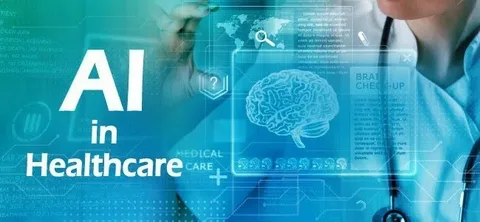Discover how AI applications in healthcare are transforming patient care, diagnosis, and medical research with innovative solutions.
Introduction
Artificial Intelligence (AI) is no longer a futuristic concept—it is already reshaping industries, and healthcare is one of the biggest beneficiaries. From predicting diseases before symptoms appear to improving treatment outcomes, AI applications in healthcare are driving innovation at an unprecedented pace. Hospitals, pharmaceutical companies, and diagnostic centers are leveraging AI-powered solutions to reduce costs, improve accuracy, and deliver personalized care.
In this article, we’ll explore the most impactful AI applications in healthcare, how they work, and what the future holds for this transformative technology.
The Role of AI in Modern Healthcare
AI brings data-driven decision-making to healthcare, analyzing vast amounts of medical data faster and more accurately than humans. With advancements in machine learning (ML), natural language processing (NLP), and computer vision, AI systems are now integral to everything from medical imaging to drug discovery.
Some of the major areas where AI is making an impact include:
- Early disease detection
- Personalized treatment planning
- Medical imaging analysis
- Virtual health assistants
- Operational efficiency in hospitals

AI Applications in Healthcare
1. Early Disease Detection and Diagnosis
One of the most powerful applications of AI in healthcare is predictive analytics. AI algorithms analyze electronic health records (EHRs), lab tests, and genetic information to identify potential health risks.
- AI tools like IBM Watson Health and Google’s DeepMind are capable of detecting diseases such as cancer, diabetes, and heart conditions with impressive accuracy.
- According to a study by The Lancet Digital Health, AI models can detect breast cancer in mammograms with 89% accuracy, surpassing some radiologists.
This early detection helps doctors initiate treatments before diseases progress, improving patient outcomes.
2. Medical Imaging and Radiology
Medical imaging generates massive data, and AI-powered image recognition systems are revolutionizing diagnostics.
- Radiology scans (X-rays, CT scans, MRIs) can be interpreted quickly using AI, reducing diagnostic errors.
- AI software such as Aidoc and Zebra Medical Vision can flag abnormalities like tumors or fractures in real-time.
By augmenting radiologists’ expertise, AI reduces workload and ensures faster, more accurate reporting.
3. Personalized Treatment and Precision Medicine
Every patient is unique, and AI helps tailor treatments to individual needs.
- AI algorithms analyze patient histories, genetic makeup, and lifestyle factors to suggest personalized treatment plans.
- In oncology, AI assists doctors in selecting the most effective chemotherapy drugs for specific cancer types.
This shift toward precision medicine ensures treatments are not just generalized but optimized for each patient’s biology.
4. AI in Drug Discovery and Development
Drug development is a lengthy and expensive process, often taking years. AI accelerates this process by predicting how compounds will behave in the human body.
- Companies like Insilico Medicine and Atomwise use AI to identify promising drug candidates, cutting research costs and timelines.
- During the COVID-19 pandemic, AI played a crucial role in vaccine research and drug repurposing.
This innovation could drastically reduce the time it takes to bring life-saving drugs to market.
5. Virtual Health Assistants and Chatbots
AI-driven virtual assistants are transforming patient engagement and support.
- Chatbots like Babylon Health provide 24/7 medical advice by analyzing patient symptoms.
- AI-powered apps remind patients to take medications, schedule appointments, and track progress.
These tools improve patient adherence to treatment while reducing the burden on healthcare providers.
6. Remote Patient Monitoring and Wearables
With the rise of telemedicine, AI has become essential in monitoring patients outside hospitals.
- Smartwatches and wearable devices use AI to track vital signs such as heart rate, oxygen levels, and blood pressure.
- For chronic disease management, AI systems alert healthcare providers when anomalies are detected, ensuring timely interventions.
This leads to proactive care, especially for patients with conditions like diabetes or heart disease.
7. Hospital Administration and Workflow Optimization
AI is not limited to clinical care—it also improves operational efficiency in healthcare facilities.
- AI systems predict patient admissions, optimize staff scheduling, and reduce wait times.
- Natural language processing helps in automating medical transcription and updating EHRs.
By streamlining hospital management, AI ensures doctors and nurses spend more time on patient care rather than paperwork.
Benefits of AI in Healthcare
The integration of AI offers multiple benefits:
- Faster and more accurate diagnosis
- Reduced healthcare costs
- Improved patient satisfaction
- Better management of chronic diseases
- Enhanced drug development efficiency
Challenges and Ethical Considerations
While AI has immense potential, it also brings challenges:
- Data privacy concerns – Patient data must be protected under laws like HIPAA.
- Bias in algorithms – AI models trained on biased data may produce inaccurate results.
- High implementation costs – Smaller hospitals may struggle to adopt AI technologies.
To fully realize AI’s potential, healthcare providers must ensure ethical AI adoption and maintain transparency in decision-making.

Future of AI in Healthcare
The future of AI in healthcare looks promising:
- Robotic surgeries guided by AI will become more precise.
- Predictive healthcare systems may forecast disease outbreaks.
- AI-driven genomics will unlock new frontiers in personalized medicine.
As AI continues to evolve, it will become a trusted partner for doctors, researchers, and patients worldwide.
Conclusion
AI applications in healthcare are reshaping the industry, offering innovations in diagnosis, treatment, drug discovery, and patient engagement. While challenges exist, the benefits of AI—faster care, improved accuracy, and reduced costs—make it a game-changer for the future of medicine.
Healthcare organizations that embrace AI today will be better positioned to provide efficient, patient-centered care tomorrow.